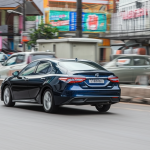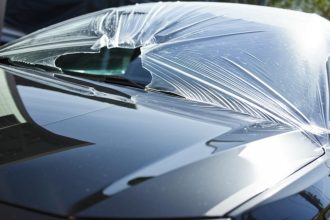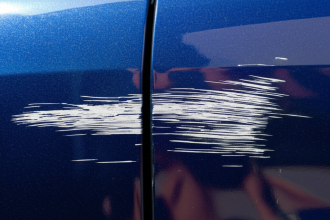The daily school run. It’s a familiar routine for countless parents across Thailand. Juggling backpacks, lunchboxes, morning grogginess, and navigating often chaotic traffic or tight condominium parking lots. Amidst this controlled chaos, the last thing you need is the heart-sinking sound of a car door scraping against a concrete pillar, or the wince-inducing sight of tiny fingerprints (or worse, toy car tracks!) appearing on your precious car’s paintwork. We love our kids, and we rely on our cars, but let’s be honest – sometimes, the combination feels like a recipe for cosmetic car damage. You find yourself parking further away, constantly reminding the kids to be careful, and generally adding another layer of stress to your already busy day. This begs the question: in the unique environment of family life and Thai driving conditions, is investing in something like TPU paint protection film (PPF) actually a practical solution, or just an expensive extra?
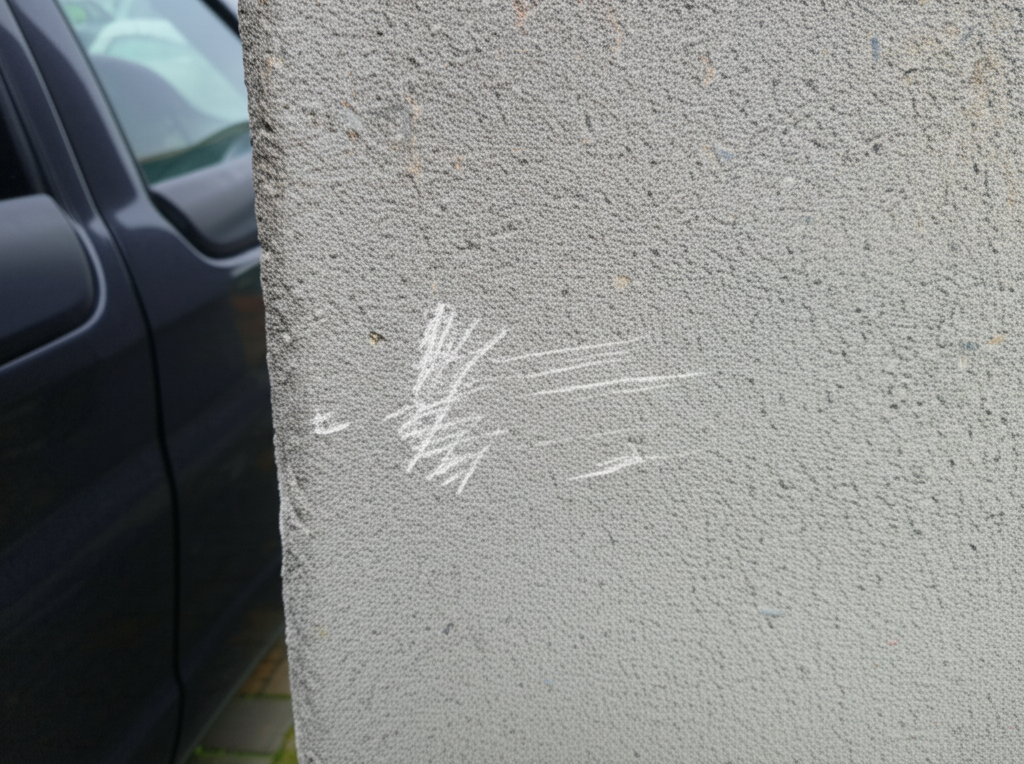
Meet Anong: A Bangkok Mum’s Journey to Paint Peace of Mind
Anong lives in a bustling area of Bangkok and ferries her two children, aged 5 and 8, to school every day in her family SUV. Like many, her condo parking is tight, and the school drop-off zone is a daily test of spatial awareness. “Honestly, I was constantly anxious,” she admits. “Every time I parked, I’d hold my breath hoping the kids wouldn’t swing the door open too wide. We had a close call with a neighbour’s car, and I knew those little scratches from bags, keys, and just general kid-handling were adding up. The thought of an expensive respray was always at the back of my mind.”
After seeing a friend’s car looking immaculately preserved despite similar usage, Anong started researching paint protection options. She learned about TPU (Thermoplastic Polyurethane) film, known for its durability and self-healing properties. Skeptical but hopeful, she decided to invest in a full front-end and door edge/cup protection package from a reputable installer specializing in the Thai climate. “The process was straightforward,” Anong recalls. “The technicians were meticulous, explaining how the film works and how to care for it. It took a couple of days, but when I picked up the car, it looked even glossier than before.”
The real test came a few weeks later. During a hurried morning, her youngest accidentally scraped his metal water bottle along the rear door handle area while climbing in. “My heart stopped,” she says. “I expected a deep, ugly scratch. But when I looked closely later, after wiping it down… nothing. Maybe a faint mark on the film itself, but the paint underneath was perfect. The film did exactly what it promised. And those tight parking spots? I still cringe a little, but the fear of that inevitable scrape against the pillar is massively reduced knowing the film is there as a first line of defence. Even the constant tapping my son does on the window sill from his car seat isn’t marking the door panel trim like it used to (as I opted for some interior protection too).” Anong’s anxiety levels regarding her car’s paint have plummeted, making the daily school run significantly less stressful.
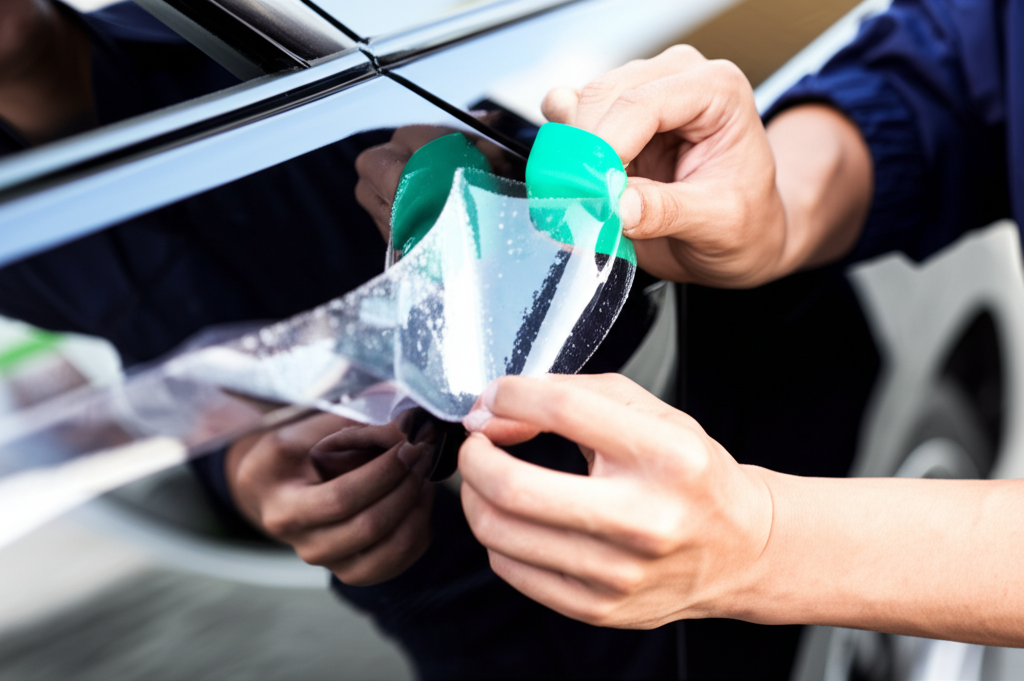
TPU Film Explained: More Than Just a Sticker
So, what exactly is this TPU film that brought Anong such relief? It’s not just any plastic film. TPU stands for Thermoplastic Polyurethane, an advanced polymer known for its elasticity, transparency, abrasion resistance, and crucially, its ‘self-healing’ capabilities. Unlike older, cheaper PVC (Polyvinyl Chloride) films that can yellow, crack, and offer limited protection, TPU is designed for long-term durability and optical clarity.
How does it compare to other forms of paint protection?
| Feature | TPU Film (High Quality) | PVC Film (Lower Quality) | Wax / Sealant | Ceramic Coating |
|---|---|---|---|---|
| Primary Protection | Excellent against scratches, stone chips, bug splatter, bird droppings, minor impacts, UV rays. | Minimal scratch resistance, some UV protection. | Minor protection against contaminants, UV rays; enhances gloss. No impact/scratch protection. | Good chemical & UV resistance, enhances gloss, hydrophobic. Minimal scratch/impact protection. |
| Self-Healing | Yes (minor scratches disappear with heat). | No. | No. | No (some claim minor ‘filling’, but not true healing). |
| Material | Thermoplastic Polyurethane. | Polyvinyl Chloride. | Natural or synthetic wax/polymers. | Silicon Dioxide (SiO2) based liquid polymer. |
| Durability / Lifespan | 5-10+ years (depending on quality & care). | 1-3 years (prone to yellowing/cracking). | Weeks to months. | 1-5+ years (depending on quality & maintenance). |
| Clarity & Finish | Excellent optical clarity, high gloss or matte finishes available. Non-yellowing (high quality). | Can reduce clarity, prone to yellowing/orange peel effect. | Enhances existing gloss temporarily. | Enhances gloss significantly, creates slick surface. |
| Typical Price Range (Thailand – indicative) | Higher initial investment (e.g., ฿30,000 – ฿100,000+ for partial/full wrap). | Lower cost (e.g., ฿10,000 – ฿30,000). | Lowest cost (e.g., ฿500 – ฿3,000 per application). | Moderate cost (e.g., ฿8,000 – ฿30,000+). |
| Best Suited For | Maximum physical protection, preserving paint condition & resale value, high-risk areas (front end, doors), parents with young children, frequent highway driving. | Short-term aesthetic changes, very budget-conscious (but low protection). | Regular DIY maintenance, enhancing gloss, basic surface protection. | Ease of cleaning, chemical resistance, enhanced gloss (often combined with PPF). |
As the table shows, while options like waxes and ceramic coatings offer benefits in terms of gloss and ease of cleaning, they provide minimal defence against the physical impacts common in family use – dropped toys, scraped bags, door dings, and the dreaded wall encounters. PVC films are cheaper but lack the durability, clarity, and protective qualities of TPU. For parents dealing with the specific challenges of school runs and child-related wear and tear in Thailand, high-quality TPU film offers the most robust and long-lasting solution for preserving the car’s paintwork.
Voices from the School Run Crew: Real Parents, Real Relief
Anong isn’t alone. Many parents in Thailand have discovered the practical benefits of TPU film:
“Parking at my kids’ international school used to give me anxiety. The spaces are narrow, and everyone’s in a rush. Since getting TPU on the doors and bumpers, I feel so much calmer. I know a minor bump won’t mean a trip to the bodyshop. Worth every Baht for the peace of mind!” – Somsak, Father of two, Nonthaburi.
“My daughter likes to ‘help’ load her own school bag, which usually means dragging it across the boot sill. That area was getting so scratched! We had TPU film applied just there and on the door edges. It’s invisible, but it works. No new scratches since!” – Pim, Mother of one, Chiang Mai.
“Forget just the kids – it’s the tight mall parking lots and Bangkok traffic! Motorbikes squeezing past, pillars jumping out… The full front wrap and doors was an investment, but seeing how it shrugs off minor scuffs that would definitely have chipped the paint makes me glad I did it. My car still looks new after two years of daily school runs.” – David, Father of three, Bangkok.
The common theme? A significant reduction in stress and worry about unavoidable minor damage, allowing parents to focus more on their children and the driving task itself.
Ready to Shield Your Family Car?
If the scenarios described sound familiar – the tight parking squeezes, the unpredictable actions of little passengers, the desire to keep your family vehicle looking its best despite the daily grind – then TPU paint protection film could be a game-changer for you. It’s an investment in preserving your car’s value, avoiding costly paint repairs, and most importantly, reducing your daily stress levels.
Want to learn more about how TPU film can protect your specific car model and withstand the rigours of family life in Thailand? Get in touch with our experts for a free consultation and personalized quote. Let us help you enjoy the journey, worry-free.
📱 Want to learn more about car wrap & paint protection?
Feel free to reach us on LINE:

🌐 Official Website: https://tpuwraps.com
Frequently Asked Questions (FAQ)
- Q: Is TPU film very expensive in Thailand?
- A: The cost varies depending on the quality of the film, the size of your vehicle, and the coverage area (e.g., front bumper only, full front, full car). While the initial investment is higher than waxing or ceramic coating, consider it against the cost of potential paint repairs (often ฿5,000-฿15,000+ per panel) and the preservation of your car’s resale value. Quality TPU film often starts around ฿30,000 for partial front coverage.
- Q: Will removing the TPU film damage my car’s original paint?
- A: If you choose a high-quality TPU film and have it professionally installed and removed, it should not damage your car’s factory paint. In fact, it protects the paint underneath. Issues usually arise from low-quality films or improper removal techniques.
- Q: How long does the installation take?
- A: Installation time depends on the coverage. Partial front protection might take a day, while a full car wrap can take 2-4 days to ensure meticulous application and proper curing time.
- Q: Can I wash my car normally with TPU film installed?
- A: Yes! You can wash your car as usual. Hand washing is generally recommended. Avoid high-pressure washing directly at the film’s edges. Most quality TPU films are hydrophobic, making washing easier.
- Q: Does the film protect against major accidents?
- A: TPU film is designed to protect against minor scratches, chips, and abrasions. It will not prevent dents or damage from significant impacts or collisions.
The Verdict: A Smart Investment for Stress-Free Family Motoring
For parents navigating the daily challenges of school runs, shopping trips, and family outings in Thailand, a car is more than just transport; it’s a mobile base camp and a significant investment. Protecting that investment makes practical and financial sense. TPU paint protection film, particularly on high-impact areas like bumpers, door edges, door cups, and boot sills, provides a tangible barrier against the everyday wear and tear inflicted by tight spaces and small passengers.
It’s not just about keeping the car looking new; it’s about reducing worry, avoiding the hassle and cost of repairs, and ultimately making your daily drives a little less stressful. So, is TPU film worth it in a family scenario? Based on real-world experiences and its protective capabilities, the answer for many Thai parents is a resounding yes.
